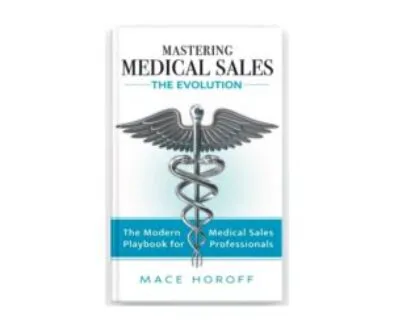When Your Medical Sales Presentations Don’t Go Well
I’m amazed whenever a medical device representative bungles a presentation. The
sales presentation – that shining moment when those of us who have chosen this
profession get to demonstrate our skills and ability – becomes a display of
incompetence. In my opinion, this occurrence is due to two things:
1. Lack of proper preparation, or
2. Not being ready for “prime time”
Let’s take number 1 – Lack of proper preparation. Here is what I have found to be the
truth. Most sales people, especially the more seasoned ones, don’t put the time in to
prepare for a presentation like they should. Too many of them “think” they already
know all there is to know about the product or service that they are presenting. There
seems to be a sense that one can assemble the presentation on the fly, after all, we’re
professionals, right?
Wrong! The doctors you are presenting to can sense on both a conscious and
subconscious level whether or not you have prepared. It shows in every part of the
presentation – how you begin, the questions you ask, how you transition from segment to
segment, the visual aids and samples you use, and how well the entire presentation is
choreographed. Let’s stop and consider for a moment what this means to a doctor who is
considering your company’s products or services for one of his patients.
My experience was mainly selling surgical implants and equipment. If a doctor was
considering my product, he was assessing at some level, how well prepared I was going
to be when I went into the operating room with him. Let’s face it; the surgeon has much
to worry about just performing the procedure. He is going to do business with sales
people he knows and trusts to be prepared. If you don’t convey good preparation
during your sales presentation, how much confidence do you expect a doctor to have in
your abilities to perform where it really counts?
I know how a lot of the “pros” think – “I excel when I am under pressure. I have years of
experience. I can get any surgeon through just about any situation he will encounter while
using my product.” While you might be aware of your abilities, have you displayed a level of
commitment and professionalism that reflects that during the presentation?
Preparation is especially true when your company releases new products. You may have a great
history with a doctor, but when you present a new product, he may be wondering
how familiar you truly are with it. Have you ever been asked, “How many of these procedures
have you been involved with?” I remember many times having to reply, “Well, to be honest sir,
you will be the first!” Now, I can tell him how well-trained I am with the new product and
that I have practiced with the instruments, read all the materials, etc., but regardless of
what I say, he’ll sense my confidence or lack thereof all on his own..
The bottom line is this:
* If you have been over the material so many times that you know the words on the
paper before you read them…
* If you have organized the flow of the presentation that you sequence into “what’s
next” without thinking about it…
* If you have practiced with whatever visual aids you will use so many times that
the print is discoloring your fingertips…
* If you are sick of hearing yourself do the presentation…
* If you have tailored your presentation specifically for each customer…
…Then you are probably ready for the presentation!
You see, I believe that you have to know the presentation so well that you can observe
and process any subtle clues that your customer may be sending. If you are thinking
about what you are going to say in the next sentence, you miss a lot. And what you
miss might be the key to the sale!
If you sell to health care providers and professionals, you have to get this. There
are big stakes in this game – patients’ lives, hospitals’ and physicians’ reputations
and the trust they place in you and your company. You may have heard it from me before,
but it’s too important not to say it again – What we do as medical device sales people
is just too important to not be thoroughly prepared every time we engage a customer!
Would you fly with a pilot who is not prepared for the flight? Guess what? Your customers
are dealing with people’s lives and will only do business with you if they believe that you
are prepared to help them in their efforts. That makes the stakes pretty high for you as
well.
Now let’s consider reason number 2 – you, the sales rep, are not ready for prime time.
Prime time is the precious time that your customers allow you to present to them and
service them. You are either up to the task, or you’re just not there yet. Companies
want their representatives out selling, and many managers believe that their reps will
only learn by doing. There is some truth in that, but the failure is often in the company
not providing the right training and then letting the new rep “solo” too soon.
Consider how a student pilot trains. The training is done either in a flight simulator, or
in a real airplane with a flight instructor at the student’s side who will keep him out of
trouble. Give the student the airplane to fly on his own too soon and three things can
happen. One, you lose a lot of pilots because they crash and burn. Two, you waste
valuable resources like airplanes (or in your company’s case training because it is
consumed in the loss of number one). Three, you lose your current customers or you
fail to acquire any new ones because they are too scared to “fly” with you!
When you demonstrate consistent competency based on good training and
professional habits, you are ready for “prime time.” Head out to the “flight line” before
then and all you are doing is showing your customers and your competitors that you
are not ready.
Once you have reached a level of success, the training isn’t over. In fact, it may take more
training – not less – to advance from where you are to where you want to go. Realize that your
skills will get rusty over time, and only you can do something to get them back up to speed.
Airline captains are required to undergo intensive recurrent training every six months. What
is your plan to maintain your medical sales skills?
Nothing takes the place of good preparation, and nothing can hurt your company’s
reputation more than rolling out sales reps that are not ready or are losing their edge.
Maintaining your skills and taking the time to prepare are essential keys to your medical
sales success.



@ 9:01 pm
Mace,
It’s a tough balance emphasizing the importance of what a rep has to know and not “psyching out” a new rep or prospective rep. This was a sobering, if not daunting, article. But I guess it should be. You’re right. The stakes are higher. Thanks for the reminder.